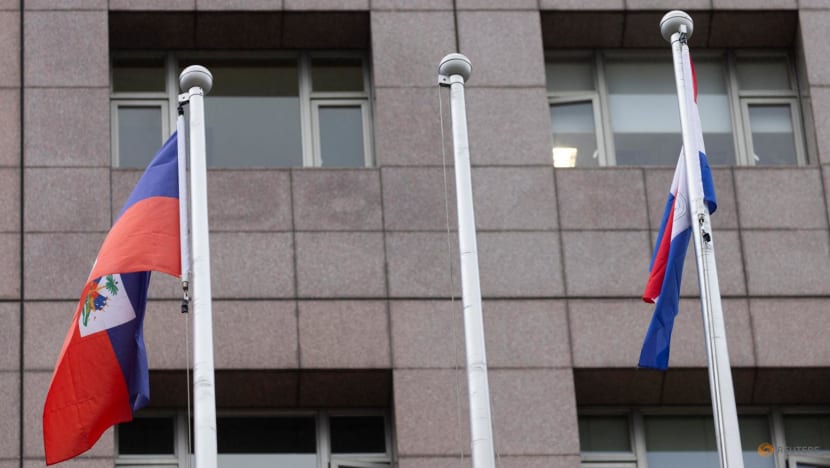CNA Explains: Why tiny Nauru ditched Taipei for Beijing - and why it matters
How did Taiwan, China and the US react to the island nation switching diplomatic ties, and what could happen next? CNA's Beijing correspondent Olivia Siong takes a look.

An empty flag pole where Nauru's flag used to fly is pictured next to flags of other countries at the Diplomatic Quarter which houses embassies in Taipei, Taiwan, Jan 15, 2024. (Photo: Reuters/Carlos Garcia Rawlins)

This audio is generated by an AI tool.
BEIJING: Just two days after a Taiwanese election with its ruling party securing the presidency, the Pacific island of Nauru said it was cutting formal diplomatic ties with Taipei, in favour of establishing relations with Beijing.
What exactly happened?
On Monday (Jan 15), Nauru’s President David Adeang announced in a national address his country’s decision to end its decades-long ties with Taiwan to recognise China.
The Nauru government also said in a statement that the move was in the “best interests” of the island nation and its people.
It added that Nauru would be moving to follow the "one China principle" and was seeking a resumption of full diplomatic relations with the People’s Republic of China – referring to China’s official name.
“This means that the Republic of Nauru will no longer recognise the Republic of China (Taiwan) as a separate country but rather as an inalienable part of China’s territory,” said the statement.
It also called this “a significant first step in moving forward with Nauru’s development.”
China claims Taiwan as part of its territory and sees it as having no right to establish state-to-state ties - a position which Taipei rejects.
Nauru, one of the world’s smallest independent states, first established diplomatic ties with Taiwan in 1980.
In 2002, it also cut ties with Taiwan in favour of Beijing. But relations with Taipei were re-established three years later, in 2005.
Nauru sits in the south-west Pacific Ocean, with a population of about 13,000 people and a total land area of 21 sq km.
Why did Nauru do this?
The Nauru announcement came on the heels of Democratic Progressive Party candidate William Lai winning a presidential race - which also marked a record third term at the helm for any Taiwanese party.
In the lead-up to the election, Beijing had made clear that Mr Lai was not its preferred candidate, repeatedly labelling him a “troublemaker” and “dangerous separatist”.
“Basically, it's a move intended to signal displeasure against the DPP and William Lai Ching-te's election,” said political scientist Wen-Ti Sung, a non-resident fellow at the Atlantic Council think-tank’s Global China Hub.
Nauru's move announcement also coincided with a visit to Taiwan by an unofficial delegation from the United States, much to Beijing’s displeasure.
But Mr Sung said while the timing conveniently gave Nauru’s diplomatic switch added significance, the US trip was not the trigger.
“Moves like this take time to pull off,” he noted.
Taiwan also alleged that China had engaged in "money diplomacy" here, by offering Nauru far more money that what Taipei provides to allies.
When asked about this at a daily briefing, Beijing's foreign ministry said: “As a sovereign country, the Republic of Nauru independently made the right choice ... This fully shows that the one China principle is where global opinion trends and where the arc of history bends.”
Beijing and Taiwan have consistently accused each other of engaging in “dollar diplomacy” to poach its allies.
What's the impact on Taiwan?
Nauru's move leaves the self-ruled island of Taiwan with just 12 diplomatic allies.
Most are small, less-developed nations in Latin America and the Caribbean: Belize, Guatemala, Haiti, Paraguay, St Kitts and Nevis, Saint Lucia, St Vincent and the Grenadines, Eswatini, Marshall Islands, Palau, Tuvalu and the Holy See, which is the central administration of the Roman Catholic Church.
Taiwan has become increasingly isolated internationally and has now lost 10 diplomatic allies since Mr Lai's predecessor Tsai Ing-Wen took up the presidency in 2016.
Last year, Honduras made the diplomatic switch from Taipei to Beijing, following in the footsteps of Nicaragua in 2021 and Kiribati and the Solomon Islands in the space of a week in 2019.
How have various parties responded?
A war of words has ensued between Taipei, Beijing and Washington.
In a hastily called media conference, Taiwan’s foreign ministry said news of Nauru's move had come suddenly and that Beijing had intentionally timed it after the election.
Taiwan's deputy foreign minister Tien Chung-kwang called it a “blatant attack on democracy”.
China’s foreign ministry meanwhile issued a statement saying that it “appreciates and welcomes the decision”, and that it “stands ready to work with Nauru to open new chapters of our bilateral relations".
The US also weighed in, saying that Nauru's “sovereign decision” was nonetheless a “disappointing one”.
“The PRC often makes promises in exchange for diplomatic relations that ultimately remain unfulfilled,” said State Department spokesperson Matthew Miller in a statement.
Beijing hit back at this on Tuesday, with foreign ministry spokeswoman Mao Ning saying the US statement undermines a sovereign nation’s independent decision and supports Taiwan in expanding its “international space.”
“It’s a serious violation of the one China principle,” said Ms Mao.
She also called on the US to handle Taiwan-related issues cautiously.
What could happen next?
Observers that CNA spoke to predicted that cross-strait tensions would rise, with Beijing likely to intensify pressure on Taiwan in the lead-up to president-elect Lai’s inauguration in May.
“The goal there will be to get Lai to adopt a characterisation of the cross-strait relationship that comes as close to Beijing's demands,” said analyst Amanda Hsiao from the Crisis Group non-profit.
The DPP has said that it favours maintaining the status quo, with Taiwan having its own government. It has also refused to acknowledge Taiwan as part of China, hence drawing Beijing’s ire.
Yet the mainland’s response has also been muted thus far, the experts noted.
They added that Beijing may be opting for less overt and forceful measures, to avoid attention or condemnation from the international community.
“There's a degree of momentum there in the US-China relationship that I'm not sure either side wants to tear up right now,” said Ms Hsiao.
Both countries have only recently resumed some exchanges, including on the military front.
Beijing had cut off talks and launched large-scale war games around Taiwan in 2022, in the wake of then-US House Speaker Nancy Pelosi’s visit to the island. It has continued to step up military pressure on Taiwan since.
Within Beijing's playbook of protesting Mr Lai's election, Nauru represents a "low-hanging fruit option”, said the Atlantic Council's Mr Sung.
He added that China's economic levers didn’t seem to have an impact at Taiwan's polls. Beijing however has warned it could suspend tariff cuts on more Taiwanese products.
“Beijing needs to retool and optimise how it’s going to use economic sanctions in a way that can send its message against Lai without unduly alienating Taiwanese society,” said Mr Sung.
“Effective punishment needs to look like a precision strike, not carpet bombing.”
















